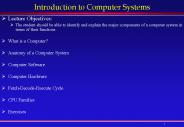Computer Programming - PowerPoint PPT Presentation
1 / 18
Title:
Computer Programming
Description:
Lab - ground floor of Math's dept. ~75 students at a time (3 ... Strictly No talking ( free to sleep!) Think of your poor friends, help them. Your Conduct ... – PowerPoint PPT presentation
Number of Views:486
Avg rating:3.0/5.0
Title: Computer Programming
1
Computer Programming Utilization(CS 101)
- Pushpak Bhattacharya
2
Course Organization
3
Computers everywhere
- Ovens, washing machines and toys
- Banks Hospitals
- Transport Reservations, Signaling
- Aircraft and industrial plant controllers
- Missiles and satellites,
- and many more
4
Why so prevalent
- They solve a variety of problems
- Efficient maintenance of large no. of data
- Precise control of movements
- Automation of many boring manual processes
- In all
- They improve the quality of life
5
Your Job
- Many improvements are made and many more to come
- You, tomorrow's quality scientists and Engineers,
are responsible for this - You need to develop expertise in using computers,
- Ability to solve more problems using computers
6
Objectives of this course
- Broad Objectives
- Introduce use of computers
- Understand how computers work
- Give an idea of the problems solved by computers
- Develop skills for effective problem solving
using computers - Write programs in a high level language
7
Course Organization
- Lectures ( twice a week )
- Monday, Thursday 830 to 930
- or 1400 to 1500
- Tutorials (once a week)
- Wednesday 1500 to 1630
- Labs. (once a week)
- Monday to Friday
- 1800 to 2030 and 2030 to 2300
8
Course Instructors
- Lectures
- myself, Pushpak Bhattacharya, CSE Dept.
- Tutorials
- in small batches in separate rooms (MB)
- you will know your batch soon
- conducted by teaching assistants (TA)
- Labs also conducted by TAs
9
Lectures
- introduce general concepts of programming
- Example programs to illustrate
- Focus on language independent concepts
- Less emphasis on details, as it is language
dependent - application of concepts more important
- concepts better learnt by reading, writing,
compiling and running programs - tutorials and lab for this
10
Tutorials
- Discussion of problems and their solutions
- Clarification of topics covered in lectures
- Tutorials in small batches ( 25 students)
- Each batch will have a Teaching Assistant
- Tutorials involve writing programs on paper
- Tutorial problems given at appropriate times
- Tutorials start from next week
- Details on the course web page
11
Laboratory
- Lab. for compiling and running programs
- advisable to write and analyze programs first
- tutorial problems may be used for lab.
- NO SEPARATE lab assignments
- One major project starting in the middle
- Lab - ground floor of Math's dept.
- 75 students at a time (3 tutorial batches)
- you will be assigned a time slot
- Lab. starts next week ( more details later)
12
Evaluation
- end semester examination 50
- mid semester examination 30
- two/three quizzes 10
- labproject 10
- all exams will be closed book and notes
- emphasis on developing and writing good, correct
programs for various problems - quizzes conducted during tutorials
13
Lab Project
- emphasis on developing a complete solution
- choose and formulate a problem
- develop ideas for efficient solution
- code and compile
- document and demonstrate
- choice of problem not important
- choose what you like most
- choose early ( before mid-semester)
14
Books
- Two easily available books on Fortran
- Introduction to Fortran 90/95, S. Chapman, Tata
McGraw-Hill, 1999 - Introduction to programming in Fortran 90 and 95,
V. Rajaraman, Prentice-Hall India, 1995. - Other books for problems
15
Other Books
- How to solve it by computer, R. Dromey,
Prentice-Hall India. - Art of Computer Programming, Vol. I, II, III, D.
E. Knuth, Addison Wesley. - Emphasis on solving problems rather than textual
material. - Problems from mathematics / science and
engineering
16
Course Web Page
- For all information see
- http//www.cse.iitb.ac.in/cs101
- For any help contact TAs via email
17
Your Conduct
- Lectures
- Non interactive
- Basic course on programming
- Course common to all I yearites
- No background assumed
- If you know,
- Please keep quiet (try to learn more)
- Strictly No talking ( free to sleep!)
- Think of your poor friends, help them
18
Your Conduct
- Tutorials
- Venue for interaction clarification
- TA s will hold
- Make full use of them
- Labs.
- Hands-on experience very essential
- Again make full use of the labs. (free labs.
possible) - Strict observance of rules given in the web page
(be aware of them)































